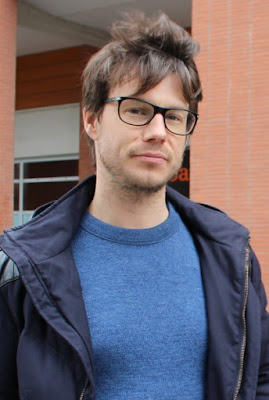In retrospect, you may realize that there are actually two complete tales being told here -- one reality-based, the other fictional. Yet Raimbault has managed to elide them convincingly enough to approach something pretty seamless.
In the leading role is one of France's finest actresses, Marina Foïs (above, left, of The Workshop and Polisse), who excels once again as a juror on that first trial who convinces a crack defense attorney to take on the case for the second trial. Co-starring, and as good as he has ever been, is Belgium-born Olivier Gourmet (above, right) as the attorney. Their scenes together crackle with high energy and utter conviction (and not the kind these two hope to prevent).
In the unusual role of the somewhat questionable defendant is an actor I've long admired, Laurent Lucas (above) -- who can play everything from a creepy murderer (Who Killed Bambi?) to dark comedy (With a Friend Like Harry) with equal aplomb. Here, Lucas barely changes expression throughout the movie yet creates something oddly indelible anyway. He's got a face you just want to watch.
Ms Foïs has a hunky love interest and a needy offspring, while the Lucas character has three kids of his own (above) who are missing their disappeared mom and their imprisoned dad, but all the supporting characters pretty much pale next to the three leads, who keep us -- along with the smart, tight tale told here -- riveted throughout. If you enjoy courtroom sagas, legal eagles and the often difficult task of serving justice, Conviction should certainly do the trick.
From Distrib Films US, in French with English subtitles and running a just-right 110 minutes, the movie opens in virtual theaters this weekend, including Laemmle Theaters in the Los Angeles area. Click here and scroll down to learn how to view it. In South Florida, click here for virtual viewing via The Movies of Delray and Lake Worth. (Remember: you do not have to be anywhere near the particular virtual theater to be able to see the movie in question.)


















